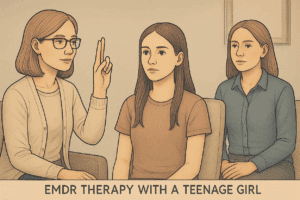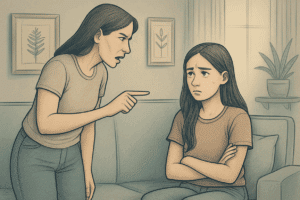Supporting a Child Through Divorce
On your wedding day, you likely never foresaw things turning out like this. But you’re not alone. Divorce is a reality for many families. In actual fact, the numbers are continually on the increase, with global rates more than doubling over the past 60 years.1 The U.S. is at the forefront of these stats—around 60% of US children currently live with their married, biological parents.2
Many people struggle to adjust after a divorce. Not only your ex-spouse and yourself but also your children who may become caught in the middle, despite your best efforts to prevent this.
But while this may be the unfortunate reality, it never has to stay that way. You can take steps to support your child through divorce, so they’re not left struggling as a consequence. In this blog, we’ll offer you 6 key ways to support your child during divorce, as well as advise you on how to tell your kids about divorce, and what not to say.
How Can Divorce Affect Children?
Divorce can affect children in many ways. Many children show behavioral changes during the first year of parental separation, although most of these resolve within 2 to 3 years.3
That said, this timeframe isn’t the same for all kids—parental divorce can shake a child’s foundations for longer, and increase the risk of difficulties in many areas of life. This includes:
- Academic difficulties (e.g., lower grades or dropping out of school)
- Disruptive behavior (e.g., conduct and substance use problems)
- Risky sexual behavior
- Depressed mood4
While this all sounds pretty dire, know that this is only one possibility. Many kids adapt well after a divorce and show no clear signs of psychological effects.
However, even the most resilient children may experience tough emotions like worrying about important occasions—graduations or weddings—where both parents will be present. What’s more, the sense of loss over no longer having both of their parents near can last for many years, worsening on holidays, birthdays, and other special events.
As a parent going through a divorce, hearing this might be difficult. But there’s a silver lining—there are things you can do to protect your child and their wellbeing during a divorce. But first, let’s go into a little more detail on the potential long-term effects of divorce on children, so you know what to look out for.
Long-Term Effects of Divorce on Children
Witnessing the breakdown of a parental relationship can be deeply destabilizing for children. More than three decades of research shows that divorces—and particularly messy divorces—can have a long-term impact on children. Let’s take a look at some of this research.
One study found that boys who experienced a parental divorce typically had lower levels of educational achievement and more difficulties finding work.5
Although girls fared better in terms of employment, they also tended to show lower levels of educational achievement. They were also more likely to have children younger (especially in their teen years.5
But to all the parents out there who are reading this, don’t panic. Each child is drastically different, and so is their response to a divorce. Nonetheless, we can’t ignore that parental divorce can have long-term, persistent effects. By recognizing these, we can take steps to help children through separation.
6 Ways to Support Your Child During Divorce
Knowing how to support a child through divorce isn’t easy, but what you do during and after a divorce is pivotal to how your child adjusts afterward. Here are some strategies to help you support them, so as to take care of their mental health and potentially avoid the divorce having a long-term negative impact.
- Talk About It
It’s crucial to have open and honest conversations about the divorce with your child. Frank and vulnerable conversations are a chance for you to acknowledge their perspective and help them reflect on what they’re feeling—remember that they’re a person going through this, too, and they had no say in the outcome.
Make time for one-on-one interactions and listen with empathy as they reflect and process things. Doing so could strengthen your relationship.
- Reassure Them They’re Loved
Have you ever received news that likely wasn’t anything to do with you, and yet you found yourself asking, “What did I do wrong?” This is often what happens when kids are told that their parents are getting a divorce.
So, when explaining the divorce to your child, remember to reassure them that it wasn’t anyone’s fault, but just a combination of factors that meant it didn’t work out.
Also, let your child know that the divorce won’t change how much they’re cared for. Emphasize that they’ll still be loved by both parents and that you’ll both continue to be part of their lives. Children need this sense of stability during this time.
- Continue Their Usual Activities and Routines
Carrying on with the usual activities and routines—like seeing friends and members of extended family, as well as going to school and keeping specific bedtimes and mealtimes— is a great way to maintain a sense of normalcy.
Routine can make things feel less overwhelming, and less like everything’s changing. Routines can also give kids a better sense of control in a situation that feels completely out of their control.
- Cooperative Parenting (Except in Situations of Domestic Violence or Abuse)
Co-operative co-parenting can help reduce a child’s stress during a divorce and support them while they adjust to your separation.5 By continuing to take responsibility for the difficult, adult parts of a divorce, you spare your child potential emotional pain.
When divorces become messy and communication breaks down, children often fall into the role of mediator between parents. However, this can be extremely emotionally distressing and potentially damaging for your child.
- Cope With Your Own Feelings
You can’t pour from an empty cup—supporting yourself and filling your emotional cup with things you enjoy is key to supporting your child through this difficult time.
As someone going through a marriage breakdown, your emotions are probably overwhelming. It’s important to recognize this and act to support yourself, as managing them is key to having the space to take on your child’s emotions and help them process these.
- Seek Professional Support If Necessary
If you think your child is struggling emotionally, don’t hesitate to seek professional support. At Mission Prep, we provide specialized support for families and adolescents navigating a range of difficult circumstances—including parental separation.
Many of our mental health treatment programs focus on the family unit as a whole. We recognize the importance of helping families to function cohesively—whether you’re living together or apart, we’re here to help you thrive, no matter the circumstances.
Our outpatient programs provide ongoing care while saving your family from further disruptions. Alternatively, our residential centers and inpatient programs offer more intensive support for children who are really struggling.
How to Tell Your Kids About Divorce
When breaking the news about divorce, it’s best to tell your children about your decision sooner rather than later (that is, once you’re absolutely sure—you don’t want to inform them of something if you think you might change your mind).
Choose a calm, private setting where your child feels safe and comfortable. Don’t tell them in a public place or right before bedtime, as this could create additional stress. A calm environment will allow your child to process the information, ask questions, and express their emotions without feeling additional, environmental overwhelm. Remember to reassure them it’s not their fault.
Avoid parental blame. It’s not fair to ask children to take sides, and it’s best if the divorce is presented as a joint decision, so choose your words carefully. Be prepared to defend your co-parent and stick to it—effective co-parenting begins the moment you inform your children as a united front.
Allow space for questions and emotions. Be prepared for a range of reactions, including sadness, anger, or even aggression. Anticipating possible reactions in advance will allow you to plan how to manage your child’s emotions in the moment.
Things Not to Say to a Child of Divorce
Knowing what to say when telling your child about a divorce is tricky. It’s easy to fall into the trap of speaking from the heart without filtering yourself. However, this harsh honesty can cause more damage than good. Generally, we recommend avoiding saying things like:
- “It’s your mom/dad’s fault”: Blaming your co-parent may harm your child’s relationship with them. Keep them out of any ongoing conflict to preserve their emotional wellbeing.
- ‘You’ll understand when you’re older”: This phrase, though often well-intentioned, can leave a child feeling confused, dismissed, and anxious. Unanswered questions can amplify their sense of uncertainty and lead them to believe worst-case scenarios. Instead, try offering simple and clear explanations that validate their emotions and provide reassurance.
- “I regret what’s happened”: Avoid using your child as an emotional sounding board. This can unfairly place them in a role of being responsible for fixing the situation or your feelings, which blurs the boundaries they’ll need to feel safe and secure. Instead, talk to trusted friends, other family members, or a professional therapist to process your emotions.
Seeking Support for Your Child During Divorce
The main worry on many parents’ minds when they’re going through a divorce is, “What about the kids?”
When it comes to how a divorce affects children, the risks are real, but so is the potential to help. As a parent, you’re not powerless. You can take real, significant steps to support your child during this process.
If you’re finding it hard to manage things by yourself, or if you notice significant changes in your child’s moods or behavior, don’t hesitate to reach out. Seeking support for helping children through separation is brave and important.
You’re not alone. At Mission Prep, we’re to support you.
References
- Eurostat. (n.d.). Marriage and divorce statistics. European Commission. Retrieved December 18, 2024, from https://ec.europa.eu/eurostat/statistics-explained/index.php?title=Marriage_and_divorce_statistics
- D’Onofrio, B., & Emery, R. (2019). Parental divorce or separation and children’s mental health. World Psychiatry, 18(1), 100.
- Kleinsorge, C., & Covitz, L. M. (2012). Impact of divorce on children: Developmental considerations. Pediatrics in Review, 33(4), 147–155.
- Lee, D., & McLanahan, S. (2015). Family structure transitions and child development: Instability, selection, and population heterogeneity. American Sociological Review, 80(4), 738–763.
- Frimmel, W., Halla, M., & Winter-Ebmer, R. (2024). How does parental divorce affect children’s long-term outcomes? Journal of Public Economics, 239, 105201.
- Cox, R. B., Brosi, M., Spencer, T., & Masri, K. (2021). Hope, Stress, and Post-Divorce Child Adjustment: Development and Evaluation of the Co-Parenting for Resilience Program. Journal of Divorce & Remarriage, 62(2), 144–163. https://doi.org/10.1080/10502556.2021.1871831


















